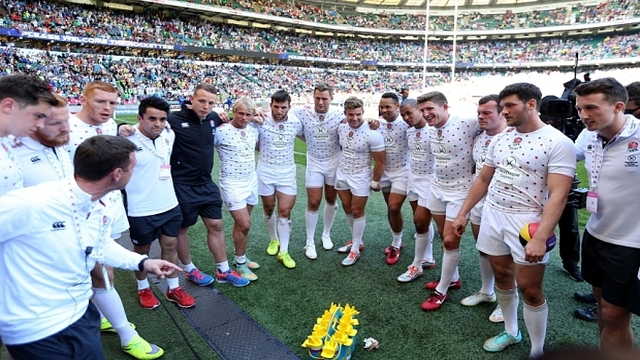Great Britain drop the ball in quest for Olympics glory
Quade Cooper’s failure to cement his place in Australia’s plans for the eagerly-anticipated Rugby Sevens competition at the forthcoming Olympics in Rio will not only serve as a huge blow to the player but also Great Britain coach Simon Amor.
Cooper has not done enough to convince his coach Andy Friend of his worth in his two outings on the HSBC Sevens World Series this year with many insisting he simply did not have enough time to make the grade.
Amor is under a similar level of pressure as he ponders how to combine the best England, Scotland and Wales have to offer ahead of their quest for a medal in Brazil when the sport takes centre stage between August 6-11.
As England coach he will benefit from his knowledge of those players already under his charge but he will not confirm the wider Team GB training squad until this week and not get to work with them as a unit until later this month.
That group will likely include a scattering of XVs players hoping to defy the odds and quite literally get up-to-speed with the shortened version of the game in just a matter of weeks.
The initial clamour for Test stars such as the fleet-footed George North and Stuart Hogg to be included has long since died down with club commitments and international tours trumping dreams of a gold medal as many had expected.
This is a costly scenario according to some, including former England international and now analyst Austin Healey, who recently went on record saying many Sevens players were just that because they were not good enough for the XVs game.
That controversial assumption perhaps ignores some of the clear differences between the two forms of the game and specifically the physical demands of each.
Either way, a few established XVs players remain in the mix in the form of Wasps scrum-half Joe Simpson, Scotland and Glasgow centre Mark Bennett and Bath wing Semesa Rokoduguni expected to make the training squad.
It will be up to Amor to assess whether these players can match the performance level of Sevens specialists but the odds appear stacked against them, despite their previous exposure to Sevens.
If a player as talented as Cooper, who boasts an enviable blend of pace, skill and showmanship, is unable to make the grade with months to play with what hope do the Team GB hopefuls have?
“Each day I have a group of 20-plus players working on different structures and patterns of play and I don’t think we would have got the very best out of Quade had we just thrown him into a tournament with limited preparation – particularly for an event as momentous as the Olympics,” said Friend as he confirmed Cooper’s omission.
In addition, other players of quite considerable quality – New Zealand’s Sonny Bill Williams and South Africa’s Bryan Habana – have dedicated a lot longer time to the task and are still not guaranteed a ticket to Rio.
Even England Sevens captain Tom Mitchell has played down their chances.
“It would be very difficult to come in with no prior experience at this stage,” he said recently.
“I think everyone who is in that wider squad will most likely have some sort of previous experience at sevens. The other side of the coin is the conditioning element. Different players, whether they’re coming in from 15 a side or not, will need more conditioning than others.”
That is not Amor’s only problem with the pressure to forge a team arguably an even greater challenge.
Great Britain will embark on a series of warm-up tournaments, including the Rugby Europe Sevens Series, where Amor must not only trial combinations but conjure some kind of team spirit while a potential axe hangs over all the players.
How envious he must be of his Fiji counterpart Ben Ryan who can bolster his squad with XVs stars such as Racing 92-bound Leone Nakarawa, Stade Francais’ Waisea Nayacalevu and Montpellier’s Samisoni Viriviri who have played so much Sevens on their respective rugby journeys.
But it is hard to have too much sympathy for Great Britain as this is a problem of their own making having dragged their heels for so long in this process.
England secured Team GB’s place in Rio with their top four finish in last season’s World Sevens Series but here we are now, over a year later, staring at an alarmingly condensed preparation period.
Amor himself was appointed last summer and yet he is still waiting to work with his players. It is a crazy and avoidable scenario.
The Rugby World Cup may have dominated the start of this season but why couldn’t those XVs players that were interested in playing at the Olympics have been identified in advance?
They could have then joined the Sevens-based contenders in a series of training camps over the last few months where coaches could have put foundations in place.
The demands of the Sevens Series could surely have been juggled with club commitments and any costs could have been shared given the significance of the Olympics and the exposure and potential boost it offers to the sport.
Instead, they expect to compete with rival rugby programs that have spent years – and plenty of money – on planning for Rio.
At least Team GB have a nice new kit – that was unveiled with great fanfare last month – but realistically a tan rather than a medal is perhaps their best hope this summer.


